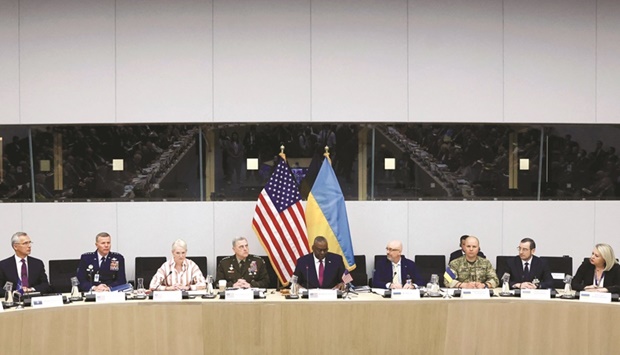The European Union’s executive is expected to propose tomorrow that Ukraine become a formal candidate for membership of the bloc, diplomats and officials say, a significant political gesture to the country as it resists Russia’s invasion.
But for the 27 EU leaders, who are set to sign off on the European Commission recommendation at a June 23-24 summit, it may force an unwelcome moment of reckoning over the failure of the bloc’s broader “enlargement” policy.
EU candidate status, sought by Ukraine since 2014 when protests in Kyiv toppled an unpopular pro-Russian president, would be a milestone in its path from a former Soviet republic towards a developed economy in the world’s largest trading bloc.
Candidate status “is a correct solution from a moral, economic and security perspective,” Romanian President Klaus Iohannis said alongside his French counterpart Emmanuel Macron at a military base in Romania yesterday.
Macron, Iohannis, German Chancellor Olaf Scholz and Italian Prime Minister Mario Draghi could visit Kyiv today.
“Before the war, you had a couple of eastern European members that uttered the possibility of Ukraine, Moldova and Georgia having a European pathway, but you had big players always saying categorically no,” a senior EU diplomat said.
“The philosophy has changed now,” the diplomat said.
But with Moldova and Georgia also likely to get EU membership status if they fulfil certain conditions, the June summit in Brussels will be a high-profile reminder that EU states cannot agree on whether to bring other official candidates — Albania, North Macedonia, Montenegro, Serbia and Turkey — into the bloc.
According to five diplomats and officials, cementing Ukraine’s candidacy risks unrealistic expectations about membership for a country at war and with endemic corruption.
They also said it was divisive at a time when the bloc is seeking unity over economic sanctions on Russia following its February 24 invasion of Ukraine. Eastern countries strongly support giving Kyiv the status of an EU candidate, but France, the Netherlands, Denmark, Belgium and Portugal have misgivings.
Two diplomatic notes seen by Reuters show the disagreement.
A Danish document argues that: “Ukraine does not yet sufficiently fulfil the criteria” of what it takes to be an EU candidate in terms of democracy, human rights, respect for minorities and the rule of law. A Lithuanian document says: “By defending their country, Ukrainians are defending European values, freedom and democracy.”
A senior Ukrainian official told Reuters that some 25 conditions have been set out by Denmark and others for Ukraine to meet, although they are not legally-binding EU standards.
The official said a positive decision “would give strong morale boost to the Ukrainian people. They really need this.”
France, the Netherlands and Denmark also say that unless the EU — which is already slow to take decisions — is reformed, it will cease to function if it grows to include new states.
France has proposed a different approach to enlargement, seeking a “ring of friends” to deepen cooperation with states that may eventually become members. That could also strengthen the EU’s role as a force for democracy and market economies.
It has circulated its proposal to EU states. French officials insist it is not an alternative to membership, and Paris has been lobbying eastern and Baltic states on the idea.
“The reality is that the war has meant countries across the board may need to have closer co-operation with the EU because there are big issues that concern them now,” a diplomat said.
Another warned against creating a “glorified EU waiting room” for Ukraine.

Nato Secretary-General Jens Stoltenberg (left), from 2nd left, US Assistant Secretary of Defence for International Security Affairs Celeste A Wallander, US Chairman of the Joint Chiefs of Staff, General Mark Milley, US Defence Secretary Lloyd Austin, Ukraine’s Defence Minister Oleksii Reznikov, Ukrainian Lieutenant General Levgen Moisuk and other officials attend the Ukraine Defence Contact group meeting ahead of a Nato defence ministers’ meeting at the alliance’s headquarters in Brussels yesterday. (AFP)
